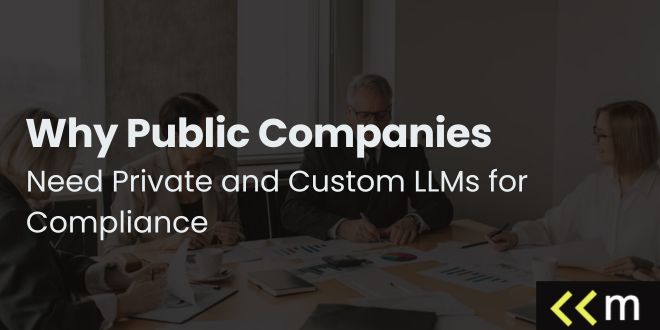SOC2, HIPAA, GDPR - What Compliance Looks Like in the Age of AI

Artificial intelligence is rapidly transforming enterprise operations, particularly when it comes to areas of compliance.
Large language models (LLMs), in particular, are being embedded in customer support workflows, legal reviews, healthcare systems, and internal communications.
But as these technologies touch sensitive information—customer data, health records, financial documents—they create new regulatory risks that many companies are unprepared to manage.
LLMs must be designed to handle sensitive information and customer data responsibly. By embedding principles of data protection and limiting exposure of sensitive authentication data, enterprises can reduce their risk footprint and maintain customer trust.
This article explores how key compliance frameworks—SOC 2, HIPAA, and GDPR—apply to AI deployments, and how private LLM infrastructure can help mitigate those risks.
Why Compliance Has Become a Critical AI Issue
As LLMs move from experimental tools to core business systems, they increasingly process regulated data. Customer service bots, internal knowledge assistants, and AI-driven analytics tools often handle personally identifiable information (PII), protected health information (PHI), and sensitive financial records.
The risks include:
- Data breaches caused by inadequate access controls or external API reliance.
- Regulatory violations from improper data handling, retention, or transfer.
- Reputational harm from public disclosure of mishandled data or AI-driven errors.
Enterprises must ensure that their AI systems meet the same compliance standards as any other critical system.
SOC 2 and LLMs
SOC 2 focuses on data security, availability, confidentiality, privacy, and processing integrity. For AI systems, this means applying robust security practices that include encryption, strict access controls, audit logging, and continuous monitoring. These safeguards are critical to protect sensitive data from breaches and to ensure regulatory compliance. AI deployments must also avoid processing sensitive authentication data, such as passwords or biometric markers, without appropriate controls in place. For LLMs, compliance requires careful attention to several areas:
- Security: AI infrastructure must include robust authentication, authorization, and encryption mechanisms to prevent unauthorized access or data leaks.
- Availability: Enterprises need documented processes to ensure that AI systems are resilient, with monitored uptime and disaster recovery plans.
- Confidentiality: Data used by LLMs—whether for training, fine-tuning, or inference—must be appropriately segmented, encrypted, and restricted to authorized users only.
- Privacy: Companies must have clear policies for how personal data is collected, processed, stored, and deleted, and these policies must apply to AI systems as well.
- Processing Integrity: Outputs from AI models must be accurate, reliable, and subject to monitoring to detect anomalies or inappropriate behavior.
SOC 2 audits of LLM deployments will typically look at audit trails, access controls, model versioning, and the monitoring of both inputs and outputs.
HIPAA and AI in Healthcare
The Health Insurance Portability and Accountability Act (HIPAA) establishes the standards for HIPAA compliance in protecting protected health information (PHI). Any AI system processing PHI must meet these standards through encryption, detailed logging, and restricted access. External providers handling PHI must sign a Business Associate Agreement (BAA) to ensure compliance. Private LLM deployments make it easier to achieve HIPAA compliance by keeping PHI inside secure, controlled environments and supporting strong data protection measures.
Key requirements include:
- Safeguards for PHI: AI systems processing PHI must ensure data is encrypted in transit and at rest. Access must be limited to authorized individuals, with detailed audit logs maintained.
- Business Associate Agreements (BAAs): Any third party that handles PHI on behalf of a healthcare provider must sign a BAA. This applies to external AI APIs and model providers.
- Prohibition on external sharing: Using public LLMs like ChatGPT or other hosted models without explicit contractual safeguards may expose organizations to HIPAA violations.
Private LLM deployments—where the model is hosted within the organization’s secure environment or on a HIPAA-compliant cloud—offer a safer path forward.
GDPR and LLM Challenges
GDPR presents unique challenges for LLMs, particularly around training data, data retention, and transparency requirements. Many models are built on large volumes of data, making data minimization and data anonymization strategies essential for compliance. Enterprises must define clear data retention policies, enabling the removal of personal information when required. Ensuring regulatory compliance with GDPR also means demonstrating accountability in how personal data is processed and protected.
LLMs introduce unique compliance challenges:
- Data minimization: LLMs are often trained on large datasets that may include personal data, conflicting with GDPR’s requirement to limit data collection to what is strictly necessary.
- Right to be forgotten: Once data is included in a model’s training set or embeddings, removing it completely can be difficult, complicating compliance with data deletion requests.
- Transparency and explainability: GDPR requires that organizations explain how personal data is used. With LLMs, black-box behavior and opaque decision-making processes make custom LLMs challenging.
To mitigate these risks, organizations can fine-tune models only on approved, compliant data; use clear data governance policies; and ensure that models are deployed in ways that allow for detailed auditability and oversight.
How Private LLMs Simplify Compliance
Private LLM infrastructure gives enterprises the control they need to align AI systems with regulatory frameworks. Key benefits include:
- Data stays within controlled environments: On-premise or private cloud deployment ensures that no sensitive data is sent to external, third-party APIs or infrastructure.
- Customizable data handling policies: Enterprises can define how data is processed, logged, and retained, tailoring it to their compliance requirements.
- Enhanced auditability: Private LLMs can be configured with detailed logging, model version control, and access records that support compliance reviews and AI audits.
What Enterprises Should Look for in a Compliant AI Platform
To ensure compliance readiness, AI platforms should provide:
- Role-based access controls (RBAC): These controls ensure that only authorized personnel can access AI systems or sensitive data processed by those systems.
- Comprehensive audit logging: Every action—whether it’s a model query, a data upload, or a configuration change—should be recorded and time-stamped for accountability.
- Model versioning and rollback: Enterprises should be able to track changes to models over time and revert to prior versions if needed.
- Integration with security operations tools: Platforms should work seamlessly with existing monitoring, alerting, and incident response systems to detect and respond to anomalies.
Conclusion
In the age of AI, enterprises must align their deployments with regulatory compliance frameworks to mitigate legal, financial, and reputational risks. Private LLMs offer the best path forward, helping organizations protect sensitive data, apply rigorous data security controls, and ensure compliance with SOC 2, HIPAA compliance, GDPR, and beyond.
Private, custom LLM deployment is the most straightforward path to achieving this. At LLM.co, we provide infrastructure designed to help organizations stay compliant with SOC 2, HIPAA, GDPR, and beyond—without compromising on AI capability.
Contact us today to schedule a demo and see how we can help secure your AI future.
Frequently Asked Questions (FAQ)
What is SOC 2 compliance, and why does it matter for AI?
SOC 2 compliance ensures that a company follows strict data security, confidentiality, and privacy practices when handling customer data. For AI systems like large language models (LLMs), SOC 2 compliance demonstrates that sensitive data is protected through encryption, strict access controls, audit logging, and secure processing. This is essential for building trust and meeting client expectations in regulated industries.
How can AI systems achieve HIPAA compliance?
AI systems that process protected health information (PHI) must comply with the Health Insurance Portability and Accountability Act (HIPAA). This means implementing safeguards like encryption, access controls, detailed audit trails, and signing Business Associate Agreements (BAAs) with third-party vendors. Hosting AI models in a HIPAA-compliant environment, such as on-premise or in a compliant cloud, is critical for healthcare organizations.
Why is GDPR challenging for large language models?
GDPR compliance is complex for LLMs because these models are often trained on massive datasets that may contain personal data. Challenges include managing data minimization, enabling the right to be forgotten, and providing transparency in how data is processed. Companies must adopt data anonymization, retention limits, and clear governance policies to align LLM usage with GDPR requirements.
What’s the advantage of using private LLMs for regulatory compliance?
Private LLMs allow organizations to process sensitive information within their own secure environments. This reduces the risk of data exposure to external providers, simplifies auditability, and makes it easier to meet compliance requirements under SOC 2, HIPAA, GDPR, and similar frameworks. Private deployments give enterprises full control over data security, access, and retention policies.
How do strict access controls protect sensitive data in AI deployments?
Strict access controls limit AI system usage to authorized personnel only, reducing the risk of data breaches or misuse of sensitive authentication data. By defining user roles and permissions, enterprises can better protect sensitive data and align AI operations with best-in-class security practices.
What types of sensitive data should never be processed by public AI APIs?
Enterprises should avoid processing protected health information, personally identifiable information (PII), sensitive authentication data, and customer data through public AI APIs unless they have clear contractual protections and compliance measures in place. Private AI deployments offer a safer alternative by keeping sensitive data within controlled environments.
Samuel Edwards is an accomplished marketing leader serving as Chief Marketing Officer at LLM.co. With over nine years of experience as a digital marketing strategist and CMO, he brings deep expertise in organic and paid search marketing, data analytics, brand strategy, and performance-driven campaigns. At LLM.co, Samuel oversees all facets of marketing—including brand strategy, demand generation, digital advertising, SEO, content, and public relations. He builds and leads cross-functional teams to align product positioning with market demand, ensuring clear messaging and growth within AI-driven language model solutions. His approach combines technical rigor with creative storytelling to cultivate brand trust and accelerate pipeline velocity.







